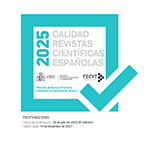Winning the game against fake news? Using games to inoculate adolescents and young adults in Singapore against fake news
Abstract
Guided by inoculation theory and studies that examined serious games as a form of intervention to inoculate individuals against fake news, this study tested the impact on college (n = 84) and junior high and secondary school (n = 30) students of a fake news computer game developed in Singapore. The findings were replicated across both samples: Those who played the game subsequently improved in their self-reported scores on perceiving fake news as a threat, skepticism toward information from social media, and being cautious about believing in information they encounter online. We also found that those who played the game scored higher in detecting fake news than those who did not play the game–consistent with the predicted effects of message inoculation.
Downloads
Article download
License
In order to support the global exchange of knowledge, the journal Estudios sobre el Mensaje Periodístico is allowing unrestricted access to its content as from its publication in this electronic edition, and as such it is an open-access journal. The originals published in this journal are the property of the Complutense University of Madrid and any reproduction thereof in full or in part must cite the source. All content is distributed under a Creative Commons Attribution 4.0 use and distribution licence (CC BY 4.0). This circumstance must be expressly stated in these terms where necessary. You can view the summary and the complete legal text of the licence.










